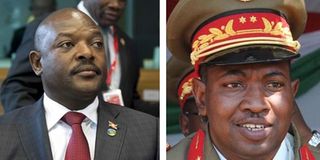Will failed coup make Nkurunziza bid legal?

Burundi's President Pierre Nkurunziza (left) is said to have returned home after coup leaders led by General Godefroid Niyombare (right) admitted the overthrow bid had failed. PHOTOS | AFP
What you need to know:
- Leaders and supporters of failed power grab ‘may take up arms if President does not abandon his third term ambition’
- Burundi’s attempted coup mastermind, Maj-Gen Godfroid Niyombare, on Friday conceded failure
Burundi could slip further into chaos if President Nkurunziza’s goes ahead with plans to vie for a third term, despite a failed coup against him.
Two scholars argue the failed coup means those opposed to his bid have run out of options and could take up arms against his government.
“The failed coup does not legitimise Nkurunziza’s candidature for third term because it has caused divisions. Secondly, it is even illegal,” says Dr Ochieng’ Kamudhayi, who teaches Conflict Management at the University of Nairobi’s Institute of Diplomacy and International Studies.
“There has been violence and people have been killed, others have been displaced. One side of the military is protecting him and the other is against him. The best thing is for the international community to prevail upon Nkurunziza to stop vying.”
CONCEDED FAILURE
Burundi’s attempted coup mastermind, Maj-Gen Godfroid Niyombare, on Friday conceded failure as he and some of his deputies were arrested. The failed overthrow allowed President Nkurunziza to return to the country for the first time since Wednesday. But observers say his third bid will still face hurdles.
“I don’t believe the failed coup will further legitimise Nkurunziza’s bid for a third term, either at home or abroad. At home, I suspect it will only serve to further polarise the country, which now seems even more susceptible to a slide into violent conflict among rival factions than it did before,” Dr Jay Ulfelder, who researches on coups and democratisation, argues.
“After all, what other channels of redress does the opposition have now? Elections were not going to be fair before the putsch, and I imagine the opposition’s room to manoeuvre will shrink further now.”
Burundi’s coup attempt received worldwide condemnations but it may not mean support for Nkurunziza’s continued presidency, the scholars warned.
“The US government has already indicated that it views Nkurunziza’s try for a third term as a provocative act, and I don’t think the failed coup attempt will change that.
“Instead, I think they will be more concerned about the impact that this intensifying conflict— of which the coup is as much symptom as cause — is having on Burundi and the surrounding region and will press for ways to contain or resolve that conflict,” added Ulfelder who runs the Dart-throwing Chimp blog on political instability.
Coups are generally condemned these days. Until Burundi’s, there had been 20 coup bids in Africa since 2010. In those incidents, six were successful while the rest were either brutally crashed or had their plotters run out of military support.
But Burundi’s case may be more different in its aftermath than the reasons behind the coup: President Pierre Nkurunziza’s candidature for a third term inspired the mutiny.
For Burundi, this was the 11th attempt to overthrow the government of the day since independence in 1962. In the 10 previous ones, four were successful, five failed and one was an alleged overthrow of a monarch in 1965 (the monarch was later overthrown anyway).
In a country that has had two presidents and a prime minister assassinated and thousands of people killed, the international community was swift to condemn the attempted coup. The East African Community announced it would not accept the coup. The African Union said it was concerned, refused to use the word coup, and instead warned against any “unconstitutional change of governments.” The UN issued a similar condemnation.
Since 2007, the AU has been relying on its Charter on Democracy, Elections and Governance to oppose power seizure through the barrel of the gun. The document was enacted to “prohibit, reject and condemn unconstitutional change of government in any member state as a serious threat to stability, peace, security and development.”
Article 25 of the charter allows the AU to suspend members from its sittings if the “unconstitutional change of government” happens. In addition, it demands that perpetrators of coups be barred from taking part in elections or even be part of the government besides warning members from providing asylum to fleeing coup plotters.
“Perpetrators of unconstitutional change of government may also be tried before the competent court of the Union…,” the charter says.
Given this loathing of coups, does it mean Nkurunziza’s has earned legitimacy to run for the third term? For a start, the AU Charter can only work if state parties cooperate. For example, if Niyombare, who was reportedly arrested on Friday, chose to run to a neighbouring country for refuge, he could only be returned if a bilateral agreement existed with Burundi.
The charter allows the AU to impose sanctions, but this also depends on the cooperation of member states.
During Burundi’s previous coup in 1996, Pierre Buyoya who had engineered a takeover was compelled into talks by then Kenya’s President Daniel Moi, DR Congo’s Mobutu Seseko, Ethiopia’s PM Meles Zenawi, Zambia’s Frederick Chiluba, Rwanda’s Pasteur Bizimungu and Uganda’s Yoweri Museveni after they unusually imposed economic restrictions on Burundi.
Those conditions no longer exist today but some researchers on African conflicts say Nkurunziza’s bid still has roadblocks.





